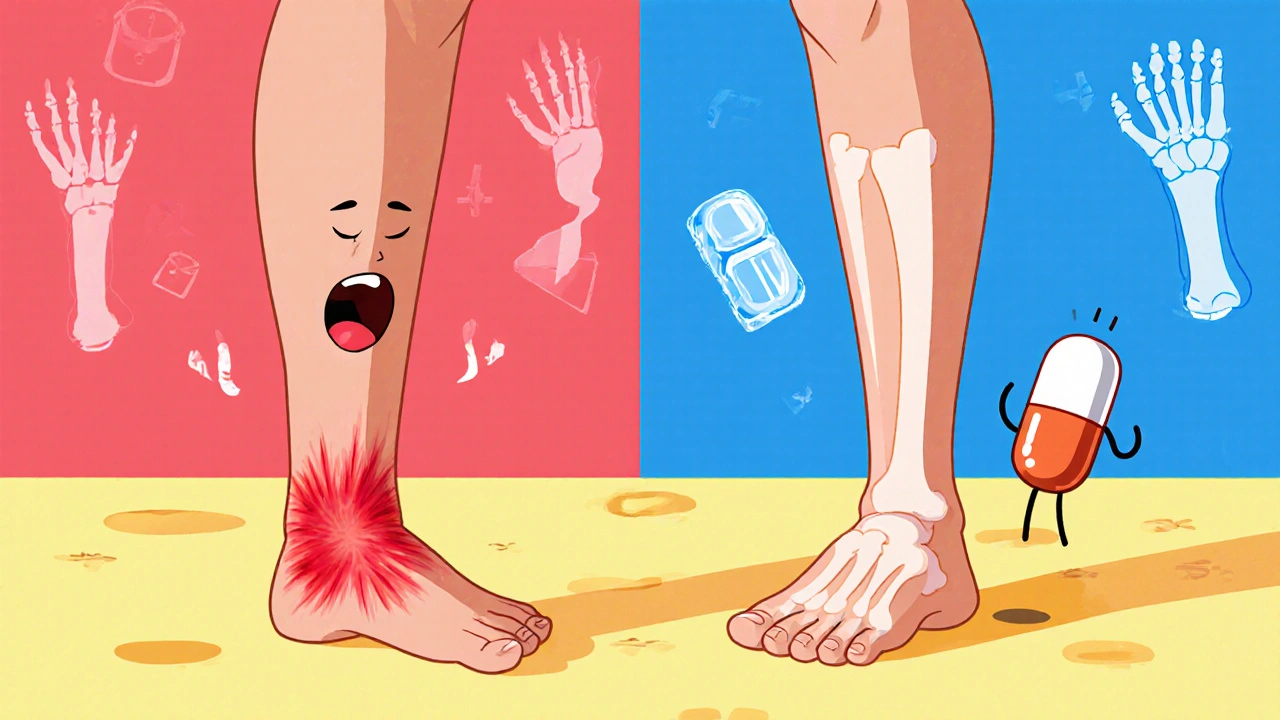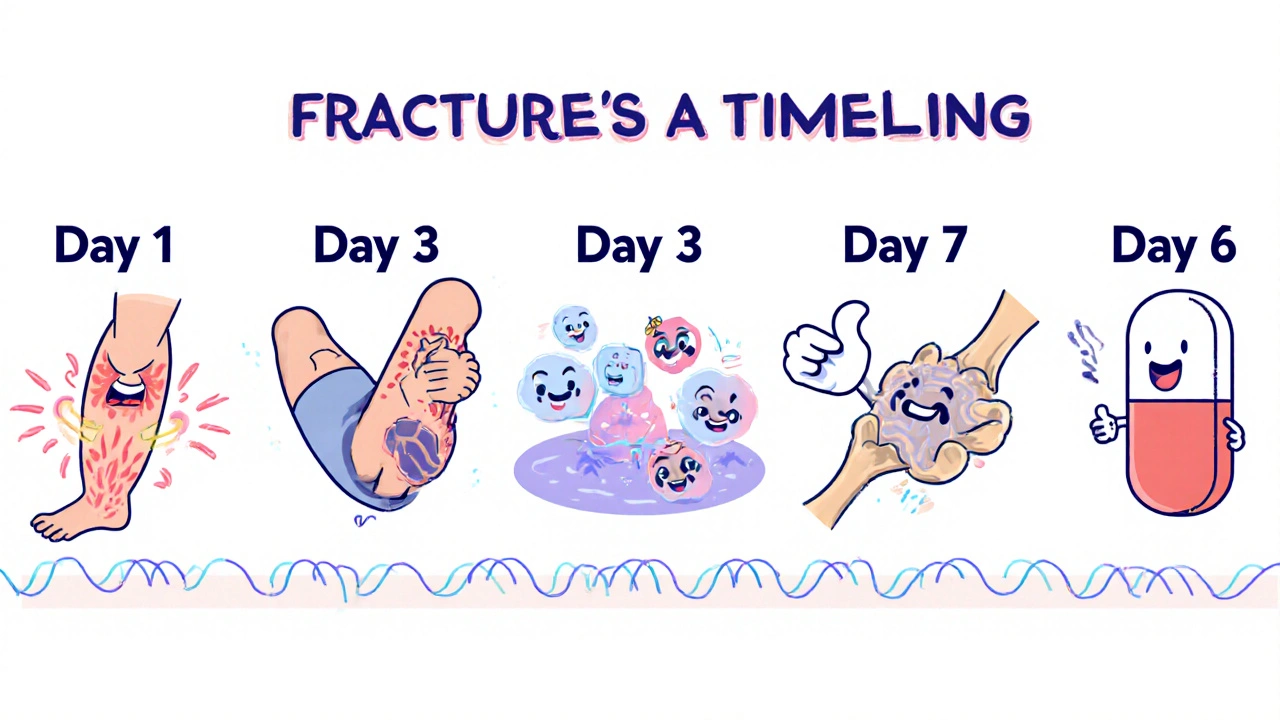
When a bone breaks, the pain doesn’t just come from the crack-it comes from the swelling, the muscle spasms, and the nerves screaming for relief. Many people reach for ibuprofen right away, and for good reason. It’s one of the most effective over-the-counter options for managing fracture pain, especially in the first few days after injury. But it’s not just about dulling the ache. Ibuprofen does something more important: it tackles the inflammation that makes healing harder.
Why inflammation makes fracture pain worse
Bone fractures trigger a natural inflammatory response. Your body sends immune cells, fluids, and chemicals to the broken area to start repair. That’s helpful-but too much inflammation means more swelling, more pressure on nerves, and more pain. You might notice your injured arm or leg feels hot, tight, or throbbing. That’s inflammation at work.
Ibuprofen belongs to a group of drugs called NSAIDs-nonsteroidal anti-inflammatory drugs. It works by blocking enzymes (COX-1 and COX-2) that produce prostaglandins, the chemicals that cause swelling and pain signals. Less prostaglandins = less swelling = less pain. It’s not just masking the symptom; it’s interrupting the process that makes it worse.
How ibuprofen compares to other pain relievers
People often ask: “Should I take acetaminophen or ibuprofen for a broken bone?” The answer depends on what you need.
- Acetaminophen (Tylenol) reduces pain but does almost nothing for inflammation. If your fracture is swollen and tender, acetaminophen won’t help much with that part.
- Ibuprofen (Advil, Motrin) cuts both pain and swelling. That’s why it’s often the first choice for fractures, sprains, and other trauma.
- Prescription opioids may be used for severe pain, but they don’t touch inflammation. Plus, they carry risks like dependence, constipation, and drowsiness.
A 2023 review in the Journal of Orthopaedic Trauma found that patients who took ibuprofen after a fracture reported better pain control and less reliance on stronger medications than those who only used acetaminophen. That’s not just a small advantage-it’s a meaningful difference in recovery.
How much ibuprofen should you take for a fracture?
The standard adult dose for pain relief is 200-400 mg every 4 to 6 hours, not to exceed 1,200 mg in a single day without medical advice. Some people feel better with 200 mg every 6 hours. Others need 400 mg every 4 hours during the first 48 hours after injury.
Don’t assume more is better. Taking more than recommended doesn’t speed up healing-it just increases your risk of side effects. Stomach irritation, kidney strain, and elevated blood pressure are real concerns, especially if you’re taking it for more than a few days.
Always take ibuprofen with food or milk. Even if you’ve taken it before without issues, your stomach is more sensitive after trauma. Skipping this step can lead to nausea, heartburn, or worse.

When ibuprofen isn’t enough-or when it’s risky
Ibuprofen works well for most people, but it’s not for everyone.
- If you have a history of stomach ulcers, kidney disease, or heart failure, talk to your doctor before using it.
- If you’re on blood thinners like warfarin, ibuprofen can increase bleeding risk.
- Some people are allergic to NSAIDs. Signs include hives, swelling of the face or throat, or trouble breathing.
- For children under 12, always check with a pediatrician. Dosing is weight-based and not the same as adults.
Also, don’t rely on ibuprofen alone. It helps with pain and swelling, but it doesn’t replace medical care. A broken bone needs proper alignment, immobilization, and sometimes surgery. Ibuprofen is a tool-not a cure.
How long should you take ibuprofen after a fracture?
Most people only need it for 3 to 7 days. That’s when inflammation peaks and starts to drop. After that, the pain usually shifts from sharp and throbbing to a dull ache as the bone begins to knit together.
Some patients keep taking it longer because they’re still uncomfortable. But if pain hasn’t improved after a week, or if it gets worse, that’s a red flag. It could mean the fracture isn’t healing right, or there’s an infection. Don’t just up the dose-call your doctor.
Long-term use (more than 10 days) without supervision isn’t recommended. The body needs inflammation to heal. Blocking it too long might slow bone repair. Studies show that while short-term NSAID use doesn’t harm fracture healing, prolonged use might delay it.

Other ways to support healing alongside ibuprofen
Ibuprofen helps with pain, but healing happens in other ways too.
- Rest: Avoid putting weight or pressure on the injured area. Movement is good later-but not yet.
- Ice: Apply ice packs for 15-20 minutes every 2-3 hours during the first 48 hours. This reduces swelling even more.
- Elevation: Keep the broken limb raised above heart level when possible. That helps drain fluid and reduce swelling.
- Protein and vitamin D: Bone repair needs protein for collagen and vitamin D for calcium absorption. Eggs, dairy, fish, and sunlight help.
- Follow-up X-rays: Your doctor will want to check progress. Healing times vary: wrist fractures take 4-6 weeks, femur fractures can take 12 weeks or more.
These aren’t just nice-to-haves-they’re essential. Ibuprofen makes you more comfortable, but the real healing comes from your body’s own repair system. Support it, don’t fight it.
What to do if ibuprofen doesn’t help
If you’ve taken ibuprofen as directed for 48 hours and your pain hasn’t eased, something else might be going on.
- Is the swelling getting worse instead of better?
- Do you have numbness, tingling, or cold skin around the injury?
- Is there redness, warmth, or pus? That could mean infection.
- Did you fall again or re-injure the area?
These aren’t normal. Call your doctor or go to urgent care. Pain that doesn’t respond to standard treatment is a warning sign.
Also, don’t switch to another NSAID like naproxen without checking. Mixing NSAIDs increases side effects without adding benefit.
Final thoughts: ibuprofen is a helper, not a crutch
Bone fractures are painful, scary, and disruptive. Ibuprofen gives you back some control during the worst of it. It lets you sleep, move slightly, and stay calm while your body does the hard work of healing.
But it’s not magic. It doesn’t fix the bone. It doesn’t replace a cast or surgery. And it shouldn’t be used longer than needed.
Use it wisely-correct dose, with food, for the shortest time possible. Combine it with rest, ice, elevation, and good nutrition. And always, always follow up with your healthcare provider.
Fractures heal. But they heal better when you treat the whole picture-not just the pain.
Can ibuprofen delay bone healing after a fracture?
Short-term use of ibuprofen (up to 7 days) does not delay bone healing. In fact, by reducing swelling, it can improve comfort and mobility during recovery. However, long-term use (beyond 10-14 days) may interfere with the early inflammatory phase that kickstarts bone repair. Always follow your doctor’s advice on duration.
Is ibuprofen safe for older adults with fractures?
Ibuprofen can be used by older adults, but with caution. Seniors are more likely to have kidney issues, high blood pressure, or stomach ulcers. Start with the lowest effective dose (200 mg) and avoid long-term use. Talk to a doctor before using it if you’re over 65 or taking other medications like diuretics or blood pressure drugs.
Can I take ibuprofen with a cast on?
Yes, you can safely take ibuprofen while wearing a cast. The cast doesn’t affect how the medication works. In fact, ibuprofen helps reduce swelling under the cast, which can prevent pressure-related pain or complications like compartment syndrome. Always check with your doctor if you have any concerns.
Does ibuprofen help with bone pain from stress fractures?
Yes. Stress fractures cause localized pain and inflammation, similar to acute fractures. Ibuprofen can help manage the discomfort and reduce swelling around the micro-crack. However, rest and avoiding impact are the real keys to healing-medication just makes the process more tolerable.
What should I avoid while taking ibuprofen for a fracture?
Avoid alcohol, as it increases stomach irritation and liver stress. Don’t take other NSAIDs like aspirin or naproxen at the same time. Skip smoking, as it slows bone healing. And don’t ignore signs of worsening pain, numbness, or discoloration-these could mean a complication needs urgent care.

 Health and Wellness
Health and Wellness
Jenni Waugh
October 31, 2025 AT 07:04Ibuprofen? Please. I’ve seen people treat fractures like they’re at a spa day-pop a pill, ice it, and call it recovery. Meanwhile, the bone’s over there quietly screaming. You don’t fix a broken skeleton with a pharmacy aisle. But hey, if you wanna numb your way through life, go ahead. I’ll be over here actually healing.
Theresa Ordonda
October 31, 2025 AT 15:05OMG YES 🙌 ibuprofen is the MVP of fracture recovery-until you realize your stomach is now a war zone. I took it for 5 days straight after my wrist broke and now I’m on PPIs. Worth it? Maybe. Did I read the label? Nope. 😅
Shanna Talley
November 1, 2025 AT 00:56Healing isn’t about silencing the pain-it’s about listening to your body. Ibuprofen helps you breathe through the worst of it, but real recovery happens in stillness, in rest, in patience. You don’t rush a bone. You honor it.
Ice. Elevate. Eat protein. Sleep. That’s the real medicine. The pill just lets you survive long enough to do the hard work.
Samuel Wood
November 2, 2025 AT 14:23Actually, the COX-2 inhibition mechanism is oversimplified in this post. Prostaglandins aren't just 'bad'-they're nuanced regulators of osteoblast activity. Most laypeople don't realize that suppressing inflammation too aggressively can downregulate bone morphogenetic proteins. But hey, if you wanna feel better for a few days, pop the blue pills. I'm sure your ortho won't mind.
ridar aeen
November 4, 2025 AT 14:06I get why people love ibuprofen. It’s easy. It’s available. But what about the people who can’t take it? The ones with kidney issues, or autoimmune stuff? This post feels like it’s written for healthy millennials who think ‘anti-inflammatory’ means ‘good for your glow-up.’
chantall meyer
November 5, 2025 AT 11:00People think ibuprofen is a cure. It’s not. It’s a bandaid on a shattered leg. You need real care. Real rest. Real food. Not a chemically induced calm while your body starves for nutrients. I’ve seen too many Americans treat bones like they’re broken phones-just swap the part.
Lorne Wellington
November 6, 2025 AT 08:41Big love for this breakdown 🙏
Ice + elevation + ibuprofen + protein = the holy trinity of fracture recovery. I’ve been a paramedic for 18 years and I still tell folks: 'Don’t chase numbness-chase healing.'
Also, if you're taking ibuprofen with alcohol, you’re not a rebel-you’re just really bad at math.
Will RD
November 7, 2025 AT 21:46ibuprofen dont fix bones. it just makes you feel less like crying. also dont take it on empty stomach. i did. now i have a hole in my gut. thanks for nothing.
Jacqueline Anwar
November 9, 2025 AT 17:37It’s alarming how casually this article normalizes NSAID use for a physiological process that requires inflammation to initiate. The author frames ibuprofen as a 'tool'-but tools can be weapons when misused. This is not a lifestyle tip. It’s a medical intervention. And yet, here we are, treating it like a caffeine boost.
Ganesh Kamble
November 9, 2025 AT 19:46bro ibuprofen is just a placebo with side effects. bone heals itself. all this 'reduce inflammation' crap is just pharma propaganda. i broke my clavicle in 2020 and took zero pills. still healed fine. also, why is everyone so obsessed with pills?